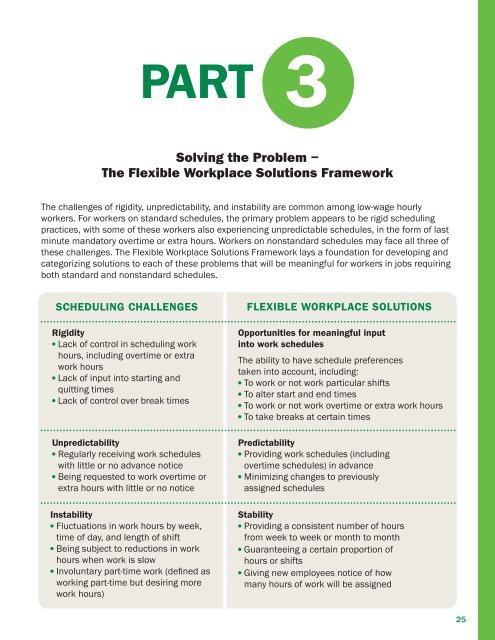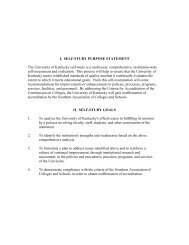Flexible Workplace Solutions for Low-Wage Hourly Workers
Flexible Workplace Solutions for Low-Wage Hourly Workers
Flexible Workplace Solutions for Low-Wage Hourly Workers
Create successful ePaper yourself
Turn your PDF publications into a flip-book with our unique Google optimized e-Paper software.
PART 3<br />
Solving the Problem –<br />
The <strong>Flexible</strong> <strong>Workplace</strong> <strong>Solutions</strong> Framework<br />
The challenges of rigidity, unpredictability, and instability are common among low-wage hourly<br />
workers. For workers on standard schedules, the primary problem appears to be rigid scheduling<br />
practices, with some of these workers also experiencing unpredictable schedules, in the <strong>for</strong>m of last<br />
minute mandatory overtime or extra hours. <strong>Workers</strong> on nonstandard schedules may face all three of<br />
these challenges. The <strong>Flexible</strong> <strong>Workplace</strong> <strong>Solutions</strong> Framework lays a foundation <strong>for</strong> developing and<br />
categorizing solutions to each of these problems that will be meaningful <strong>for</strong> workers in jobs requiring<br />
both standard and nonstandard schedules.<br />
SCHEDULING CHALLENGES<br />
Rigidity<br />
● Lack of control in scheduling work<br />
hours, including overtime or extra<br />
work hours<br />
● Lack of input into starting and<br />
quitting times<br />
● Lack of control over break times<br />
FLEXIBLE WORKPLACE SOLUTIONS<br />
Opportunities <strong>for</strong> meaningful input<br />
into work schedules<br />
The ability to have schedule preferences<br />
taken into account, including:<br />
● To work or not work particular shifts<br />
● To alter start and end times<br />
● To work or not work overtime or extra work hours<br />
● To take breaks at certain times<br />
Unpredictability<br />
● Regularly receiving work schedules<br />
with little or no advance notice<br />
● Being requested to work overtime or<br />
extra hours with little or no notice<br />
Instability<br />
● Fluctuations in work hours by week,<br />
time of day, and length of shift<br />
● Being subject to reductions in work<br />
hours when work is slow<br />
● Involuntary part-time work (defi ned as<br />
working part-time but desiring more<br />
work hours)<br />
Predictability<br />
● Providing work schedules (including<br />
overtime schedules) in advance<br />
● Minimizing changes to previously<br />
assigned schedules<br />
Stability<br />
● Providing a consistent number of hours<br />
from week to week or month to month<br />
● Guaranteeing a certain proportion of<br />
hours or shifts<br />
● Giving new employees notice of how<br />
many hours of work will be assigned<br />
25

















